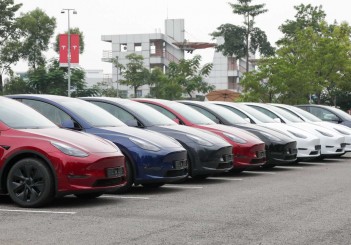MUNICH: Daimler AG and BMW AG are considering joining forces on making key automotive components, a move that would tie the traditional luxury-car rivals more closely than ever before and reflect the fundamental changes sweeping the industry.
The German manufacturers are exploring options such as joint vehicle platforms, batteries and autonomous-car technology, according to people familiar with the matter, who asked not to be identified because the discussions are private.
Collaboration would be restricted to technology that’s not brand-specific, but deliberations are in their early stages and the timing of any decisions are unclear, the people said. Daimler and BMW declined to comment.
Under pressure to invest in self-driving, electric cars, automakers are increasingly reaching out to competitors in an effort to cut costs. Volkswagen AG is in negotiations with Ford Motor Co. to cooperate on vans and potentially autonomous vehicles. Partnerships are also a way to become more agile in the race to dominate digital services such as ride hailing to counter cash-rich technology giants like Alphabet Inc.
Strains have been evident and Mercedes-Benz parent Daimler and BMW have both cut profit targets this year, blaming trade tensions as well as rising development investments. Daimler is adding a suite of 10 electric vehicles over the next four years, while BMW said it will offer 12 battery-only models by 2025.
Partnership hurdles
Joining forces on automotive technology would significantly deepen Daimler and BMW’s existing cooperation efforts. The German manufacturers already work on components purchasing and bought digital-mapping company HERE Technologies for 2.5 billion euros (RM12bil) in 2015 together with Volkswagen AG’s Audi.
This year, the pair agreed to combine their respective car-sharing platforms Car2Go and DriveNow -- a deal which received regulatory approval in the U.S. on Wednesday.
The merger of their mobility operations includes plans to add other services and has boosted prospects for more initiatives, the people said. Relations had soured last year after allegations surfaced that German carmakers had potentially breached cartel rules in Europe. The ongoing probe into suspected collusion between BMW, Daimler and Volkswagen may complicate new cooperation projects, one of the people said.
Given the complex nature of product and technology cycles, the eventual payoff from a partnership could take years to realize, the people said. Building new cars can involve decade-long planning, making cooperation notoriously difficult. In 2013, General Motors Co. sold its stake in PSA Group after failing to find savings through joint purchasing and product development, while an alliance of Volkswagen and Suzuki Motor Co. broke down in 2016.
BMW currently works with Toyota Motor Corp. to jointly make the Z4 and Supra sports cars, as well as conduct research on hydrogen cars. Daimler, meanwhile, has a cross share-holding with Renault SA and Nissan Motor Co. involving engine sharing and joint vehicle production.










